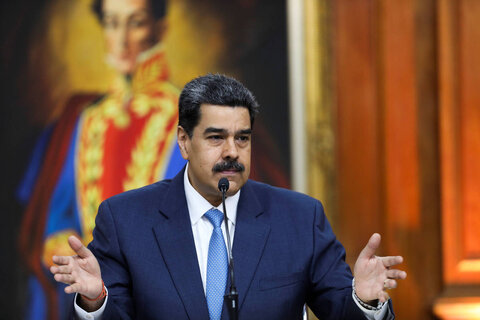Hadi Alami Fariman, in an interview with the website of the Strategic Council on Foreign Relations, added: The United States currently prefers Venezuela to buy oil, and on the other hand, they have subjected progress of oil negotiations to the progress of political negotiations between the Venezuelan government and the opposition. Therefore, Maduro did not miss the opportunity and revived the negotiations.
As for the relations between Caracas and Washington Alami Fariman explained: Relations between Venezuela and the United States of America have entered a new phase after the war in Ukraine. When the war in Ukraine happened, it overshadowed many developments in the international community; that is to say, relations went out of the normal routine, divisions and polarizations were re-imposed, energy crisis occurred and Europe also found a different situation.
Pointing out that, first of all, the importance of the energy issue increased greatly after the Coronavirus crisis, the expert continued: After the Coronavirus crisis, we saw a decrease in energy demand, and many analysts suggested that after the end of the Coronavirus crisis, we will be witness to an increase in energy demand exponentially throughout the world. The time when those discussions were raised coincided with the war in Ukraine and the developments in Russia, and this energy crisis started from there, because the Americans need convenient and cheap energy supply in their domestic issues, since the energy debate is tied to public opinion.
Alami Fariman commenting about the ways to meet the US energy needs, said: The Americans had several options before them. At first, they intended to follow the discussion of Saudi Arabia, Qatar, Kuwait and the countries of the Persian Gulf Cooperation Council, but they almost did not get an answer; then they wanted to supply their energy probably through investing in the Joint Comprehensive Plan of Action (PCPOA) and Iran, but this path also remained fruitless due to the incompleteness of the negotiations to revive the JCPOA. In the next place, the US counted on Venezuela, and lastly, they considered their strategic reserves.
The expert on Latin America affairs continued by pointing out that the road map for negotiations between Maduro and the opposition began in Mexico in 2019 with the mediation of some countries such as Norway, the Netherlands, Russia and Mexico, adding: This road map had an initial memorandum of understanding which is known as Norway’s road map and some of its principles and foundations mainly include the following cases: guaranteeing the political rights of all citizens, setting a timetable for holding elections, canceling international sanctions, restoring the rights of political opposition groups, allowing entry of humanitarian aid and the release of prisoners.
Alami Fariman continued: Such negotiations started in 2019, but since 45 countries recognized Juan Guaidó as president and Maduro himself was looking for international partners, implementation of the roadmap was delayed. Finally, recently, the US apparently began secret negotiations with the Maduro government. Although the news of the meetings was revealed, its content was not specified. After those meetings, the Americans announced that they will allow some companies such as “Eni” and “Chevron” to export oil products from Venezuela, under the condition that the relevant contract will be for 6 months and first covers the claims. Therefore, on Friday, December 2, an agreement was signed between Chevron Oil Company and Venezuela, and it seems that this agreement has opened a way to Venezuela for reducing sanctions.
The expert believes that the Venezuelan government will continue this way and will probably reach an understanding with the political opposition. We may even see broader understandings between Venezuela and international companies.
Commenting about the reasons for the 6-month period of the contract, he said: The aim of the Americans is to give Venezuela a short opportunity to test them whether the political negotiations along with the oil negotiations will go well or not. If the negotiations go well, the contract will be temporarily extended for another 6 months.
The expert on Latin America Affairs says that it seems that such cooperation will have a clear perspective for Venezuela.










0 Comments